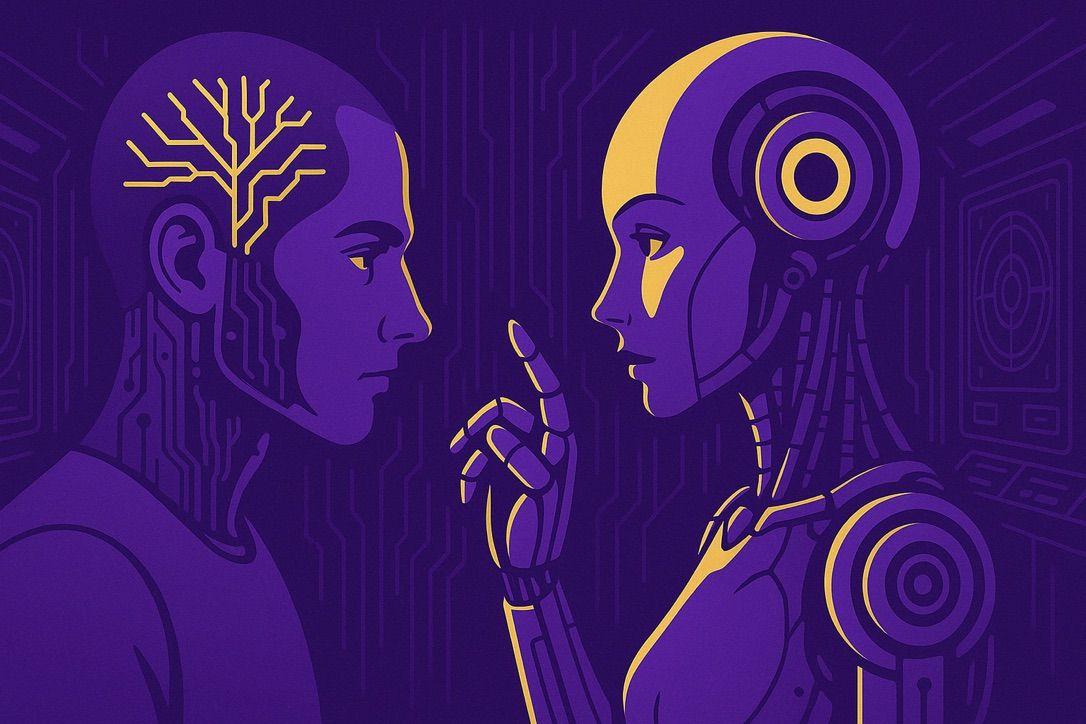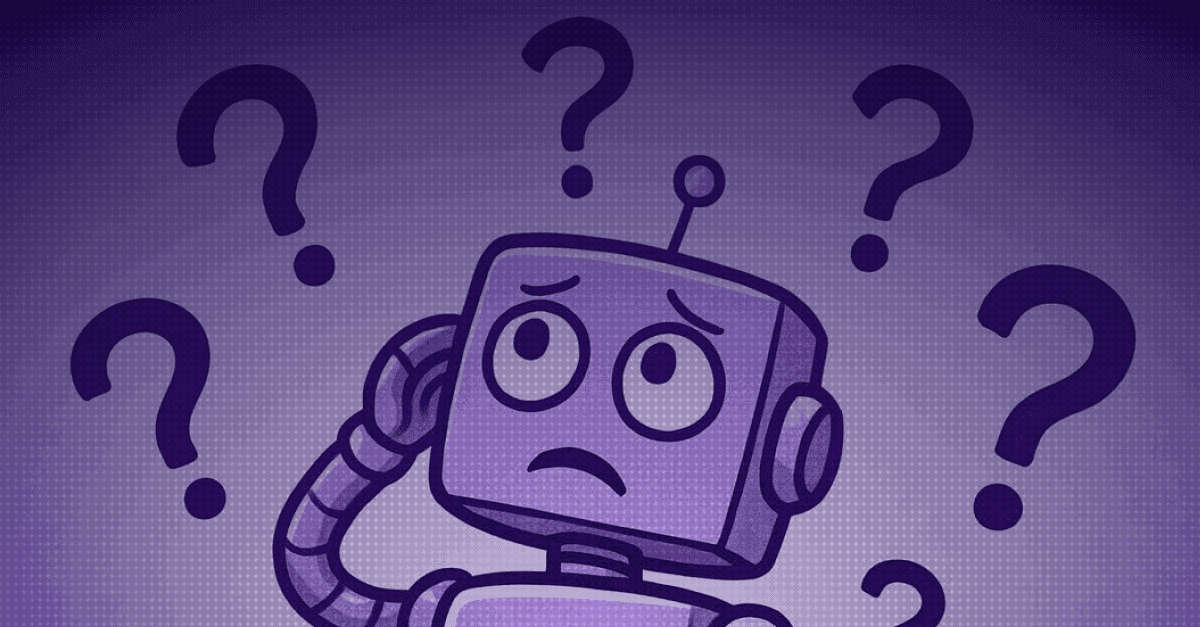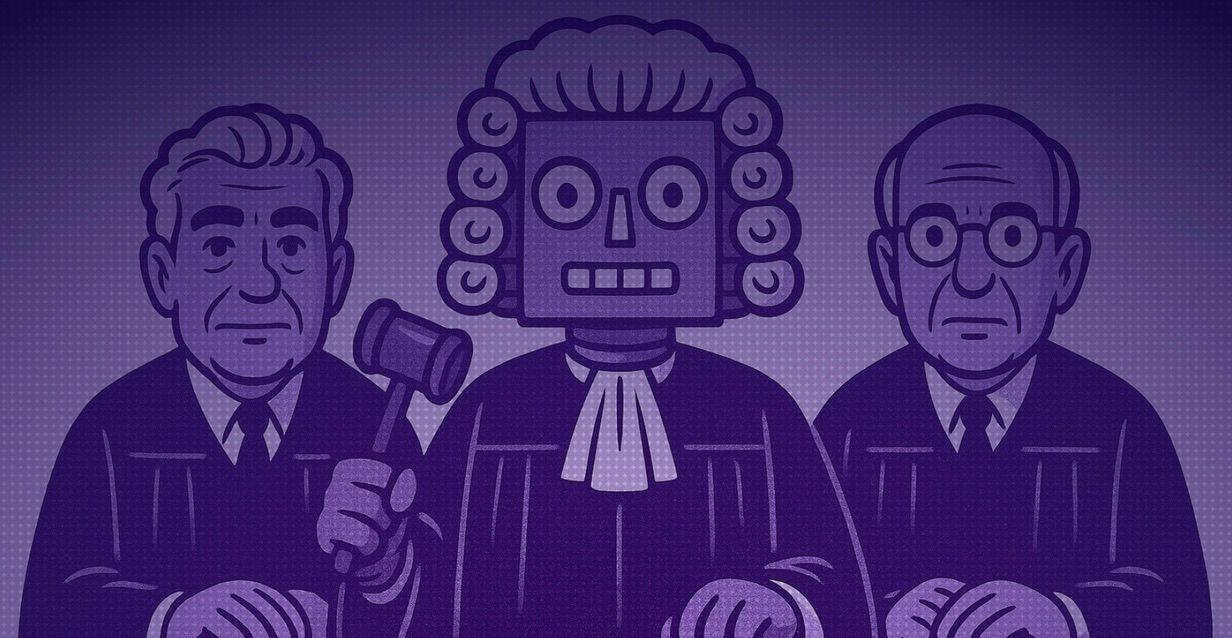- AI THREAT
- ARTIFICIAL INTELLIGENCE
- AI ETHICS
Has artificial intelligence gone too far?
Jul 7, 2025
-
Emilia Skonieczna
-
10 minutes

Have you ever wondered where AI is heading? Should we be afraid of it, or has it already gone too far? I believe the answer is yes, and you're probably not the only one.
The article presents various facts, examples, benefits, risks, and other key aspects of AI. Whether this helps you find the answers to these questions or simply sparks deeper your curiosity, that’s for you to decide.
The story of artificial intelligence begins in the 1920s, not with code, but with imagination. Science fiction writers such as Karel Čapek, who introduced the word "robot" in his 1920 play R.U.R., created early visions of intelligent machines. Real scientific efforts began in the 1950s, when pioneers like Alan Turing proposed that machines could simulate human intelligence. His famous Turing Test set the foundation for evaluating machine cognition.
In 1956, the term “artificial intelligence” was officially introduced at the Dartmouth Conference, where scientists dreamed of creating thinking machines. The following decades brought waves of excitement and disappointment, called AI winters, caused by limited progress and high expectations.
AI made a comeback in the '80s and exploded in the 2000s. thanks to increasing computing power, large data sets and advances in machine learning. Deep learning and natural language processing have brought artificial intelligence into everyday life. Tools such as Siri, Alexa and Google Translator have become part of daily routines.
Today, artificial intelligence writes essays, makes music, creates art, talks like a human and that’s just the beginning. Thanks to models like ChatGPT, Midjourney and DALL-E, we’re seeing machines create in ways we never imagined and that changes everything.

AI has both its advantages and disadvantages. But first, let's focus on its positive aspects. Artificial Intelligence offers a lot of benefits, significantly increasing productivity, innovation, and quality of life. These benefits include:
fast decision-making - AI analyzes huge amounts of data in a short period of time
personalization - AI can customize services and offers, such as product recommendations
increased precision - with Machine Learning algorithms, the accuracy of predictions, pattern recognition and diagnoses improves
solving complex problems - AI is able to analyze and solve problems that are too difficult to solve with traditional methods
reducing human error - Leads to improved quality of results, because it is less prone to mistakes brought on by fatigue, emotion or inattention
technological innovations - AI creates new opportunities and opens the door to innovations such as autonomous vehicles and smart cities
easy access to information - helps search and organize information, making it easier to access knowledge in various fields
creativity support - helps generate ideas, graphic design, music or text
assisting in many industries - AI is transforming almost every sector, including healthcare, education, finance, and marketing
cybersecurity - AI enhances cybersecurity by detecting threats, preventing attacks, and improving data protection
As you can see, AI offers a wide range of benefits, and this is just the tip of the iceberg because listing them all would take far too much space ;)
Artificial Intelligence has undoubtedly changed the world in many positive ways. While the benefits are undeniable, it is necessary to explore the potential downsides and risks associated with AI. Some of the negative applications of AI are:
job displacement - intelligent systems and automation are increasingly replacing human workers in various industries
ethical dilemmas - AI often operates through complex algorithms that make decisions without transparency
privacy threat - the collection and analysis of large amounts of data fuel many AI systems
dependence on technology - as we use AI more and more, people are starting to worry we're depending on it too much
environmental impact - AI systems need a lot of computing power, which has a big impact on the environment
lack of infallibility - despite their advanced capabilities, AI systems are prone to errors, which means that human oversight are necessary
cybersecurity - while AI helps protect cybersecurity, hackers also use it to develop more advanced cyberattacks
These are only a few negative aspects, but it is necessary to control them in order to ensure that the technology is used responsibly.
The fast advancement of AI has both incredible opportunities and serious risks. But there is no doubt that without proper regulation, uncontrolled AI development could lead to unintended consequences, such as privacy violations, security vulnerabilities or loss of human control. However, if regulations are too strict, they may slow progress and restrict the full potential of artificial intelligence.
The best possible option is a balanced approach. It's and approach that encourages new ideas while making sure there are rules set up to keep AI safe and beneficial for people. Governments, tech companies, and experts need to work together to create ethical, transparent, and adaptable AI policies.
One of the main concern regarding AI is its ethical implications. AI tools can unintentionally reinforce bias and discrimination, leading to unfair decision-making in hiring, law enforcement, or finance. Additionally, AI has the potential to threaten privacy, as corporations and governments increasingly use it for monitoring, causing concerns about extensive data gathering and exploitation.
Another important issue is automation and job displacement. As AI systems replace human workers in various industries, worries about long-term employment stability and economic inequality are increasing. While there are both risks and benefits to AI's fast development, the fear is that as AI keeps developing faster and faster, it could lead to complicated challenges we're not prepared for.
The AI dilemma concerns around how much control humans should have over these technologies. Some worry that AI in the hands of corporations and governments could manipulate human behavior for profit or power. Achieving the right balance between innovation and ethical responsibility is crucial to ensuring AI serves humanity rather than threatens it.

As artificial intelligence has changed the way we live and work, ethical standards are necessary to ensure responsible development. Several frameworks guide AI ethics, including the EU's AI Act, the OECD AI Principles, and the Asilomar AI Principles, which highlight the importance of transparency, fairness, and accountability. These guidelines help prevent bias, discrimination, and unintended consequences while promoting safe AI technologies. Ethical frameworks should also address concerns about privacy, security, and human interaction, ensuring that AI serves humanity rather than harms it.
AI regulation plays a crucial role in balancing innovation with responsibility. The OECD's framework, for example, promotes human-centered AI, while the EU's AI Act categorizes AI systems by risk levels to enforce appropriate oversight. Additionally, effective regulations should mitigate risks related to privacy and security while ensuring AI remains a tool that benefits society rather than force that manipulates or exploits it. Ultimately, ethical AI frameworks must prioritize both progress and public well-being, shaping a future where technology benefits all.
AI-powered deepfakes and misinformation are reshaping how we perceive reality. With advanced algorithms, AI can generate realistic videos, audio, and images that manipulate public opinion, spreading fake information. This makes the decision-making process more vulnerable to manipulation, raising concerns about trust in media and politics.
Another important risk is AI in autonomous weapons and military applications. When weapons operate without human control the consequences can be catastrophic. The ability to use AI for warfare raises ethical questions about accountability and the loss of human control in military applications.
Cybercrime is also evolving due to AI, as hackers exploit machine learning to automate attacks, crack passwords, and bypass security systems. AI talent is being leveraged for both defense and offense, making it double-edged sword in cybersecurity.

Artificial general intelligence (AGI) represents the ultimate goal of AI research, machines that think, learn, and act like humans. Currently, AI systems remain limited to specialized tasks and they are incapable of human-level general reasoning. The challenge lies in determining when AI should complement human abilities rather than replace them. With AI automating tasks across industries, the debate continues on whether its capabilities should have defined boundaries or remain unrestricted. Also important to recognize is the ethical dilemma of allowing AI to operate with minimal supervision.
AI advancements in medicine have revolutionized diagnostics, drug discovery, and treatment plans. By analyzing large amounts of medical data, AI can detect diseases earlier and improve patient outcomes. However, too much dependence on AI in sectors like healthcare could lead to errors if AI misinterprets data. A human-AI collaboration is a must to ensure AI enhances, rather than replaces, medical expertise.
The fear of AI surpassing human intelligence is growing, especially with the unpredictability of self-learning systems. As AI keeps improving itself, we could end up with unintended consequences, leading to outcomes beyond human understanding. The challenge is to harness AI's capabilities while maintaining human control, ensuring it remains a tool rather than an uncontrollable force.
Artificial intelligence surveillance and facial recognition are changing security and law enforcement. While they enhance public safety, they also threaten privacy. Governments and corporations are increasingly using artificial intelligence to track people, raising concerns about mass surveillance and data exploitation. Establishing clear regulations is necessary to prevent artificial intelligence from being used in ways that violate privacy.
AI-powered military technology, from autonomous drones to predictive analytics, is reshaping modern warfare. However, automating tasks such as target identification without human intervention risks deadly miscalculations. The potential for AI-driven conflicts to escalate without control makes ethical regulation necessary.
Artificial intelligence is a powerful yet double-edged tool. It offers unmatched benefits, from improving efficiency and innovation to revolutionizing industries like healthcare and finance. However, AI also raises serious concerns, including job displacement, privacy violations, ethical dilemmas, and even risks in warfare.
The key challenge lies in balancing innovation with responsibility. Without proper regulation, AI could operate beyond human control, leading to unintended consequences. However, excessive restrictions may limit progress. The solution? A balanced, ethical approach, one that encourages technological growth while ensuring safety, transparency, and fairness.
As AI continues to develop, the real question isn't whether it will change the world, it already has. The question is: how will we shape its future? Ensuring that AI serves humanity, rather than threatens it is one of the most crucial challenges of our time.

AI is powerful, but not perfect. Discover the key weaknesses it still hasn’t overcome.

Discover how artificial intelligence is transforming the legal industry - and what it means for lawyers, clients, and the future of justice.

Most SaaS cloud problems start with early decisions. Cloud consulting helps you scale safely, control costs, and build resilient infrastructure from day one.